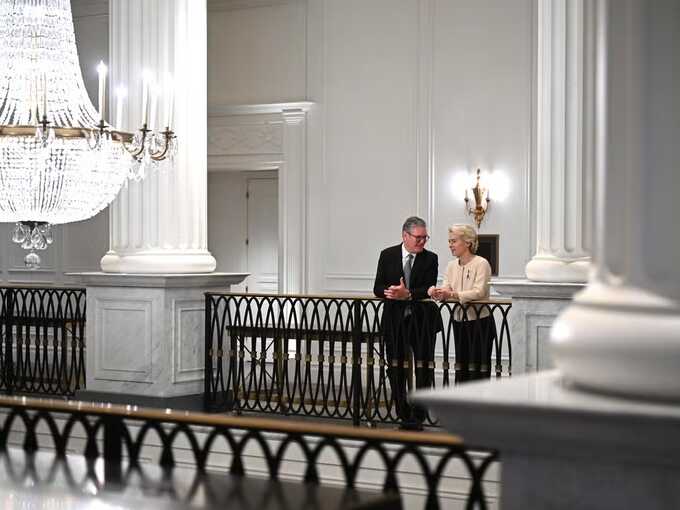Starmer’s visit to Brussels could lead to an overhaul of the Brexit deal

Prime minister hopes to use talks with European Commission president Ursula von der Leyen this week to prepare for a reset in the spring
Keir Starmer will use a meeting with the European Commission president this week to pave the way for a springtime overhaul of Britain’s Brexit deal, amid warnings that closer ties will be essential in his government’s desperate search for growth.
The prime minister will meet Ursula von der Leyen in Brussels on Wednesday. However, it comes with home secretary Yvette Cooper still vehemently opposed to an agreement that would allow young people to move more freely between Europe and the UK – a measure that EU diplomats regard as key to unlocking more serious talks in the spring.
The EU’s ambassador to the UK, Pedro Serrano, recently appeared to put forward a relatively narrow youth mobility scheme that would allow young Europeans to spend a gap year in Britain more easily, and vice versa. A more comprehensive deal was rejected out of hand by Starmer, leaving officials in Brussels unsure about how serious the UK really is about beefing up its EU links.
The talks this week are seen as paving the way for an EU-UK summit next spring. Further discussions are expected to run through the autumn to prepare for a summit, although sources have said it was too early to discuss outcomes. The summit would be between Starmer and the heads of the main EU institutions, von der Leyen and the incoming European Council president, António Costa.
Whether the UK engages on any kind of agreement for the under-30s is shaping up as an early test of how serious Starmer is about his proposed reset of relations. EU diplomats have been deeply irritated by the UK government’s description of the proposal as “free movement of people”, pointing out that any scheme would be time- and age-limited.
“The EU is particularly keen on youth mobility, which seems to have turned into a test of good faith,” said Anand Menon, director of the UK in a Changing Europe thinktank. “It’s like they’re saying, ‘if the UK is serious, it’ll make some concessions on this’. I don’t think they expect to get everything they’re asking for, but some member states are desperate.
“There’s political pressure to let young people come here. From our point of view, we want to start unlocking some of the kind of small things around the [Brexit deal] that could make life easier.”
Downing Street remains opposed to a deal on youth mobility. However, Labour insiders said Cooper remained the greatest opponent, given her desire to reduce immigration. “They are blaming Yvette for not being able to do [more], but they know they have to do youth mobility to get anything out of the EU,” said one.
There is no suggestion Labour would consider rejoining the EU’s customs union or single market – the only measures likely to be gamechangers in terms of economic growth prospects. There is also confusion in Labour’s ranks, however, over Starmer’s willingness to take political risks in order to open up a major redrawing of the Brexit deal in the spring.
“On the Labour side, there’s a political pressure to be seen to be doing something,” said Menon. “It’s almost the mirror image of the Tories, because they spent a lot of time talking more extremely about the EU than they were willing to act in practice. With Labour, its members and voters want them to have a closer relationship with the EU, so Labour has to do enough to keep those people happy without actually breaching any of its red lines.”
A senior EU diplomat welcomed von der Leyen’s proposed reset of EU-UK relations, but suggested London also had to make the running in bringing forward proposals. “We are missing Great Britain very much on many issues in the council [of EU ministers],” the diplomat said. “A better relationship is very important, but again what is very important is to remember that it was the UK that quit.”
Read more similar news:
Comments:
comments powered by Disqus

































